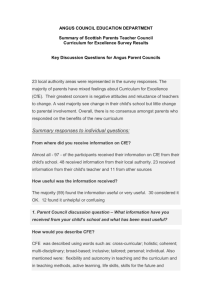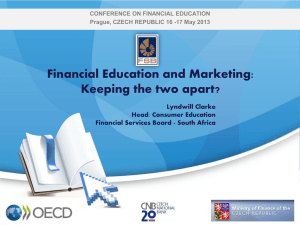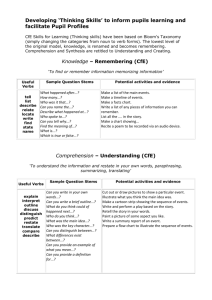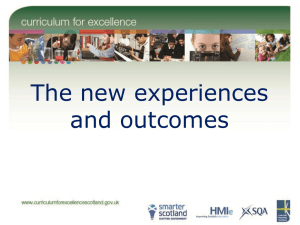Focus Group for parents 7-9pm, Council Chambers, Hamilton, North Lanarkshire
advertisement
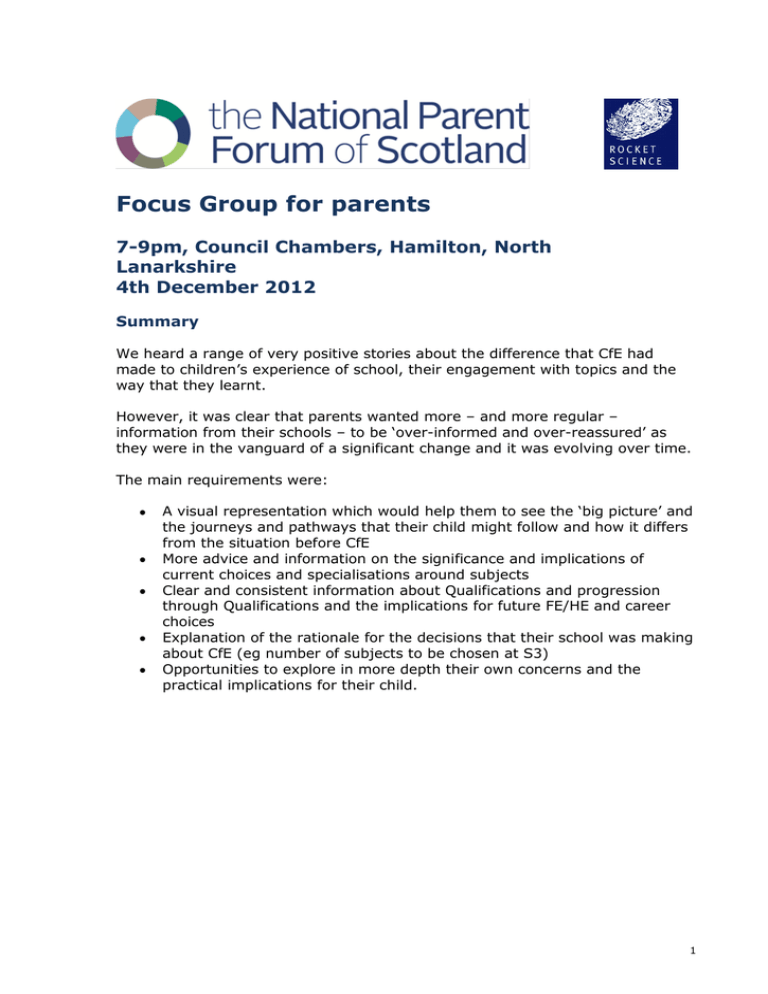
Focus Group for parents 7-9pm, Council Chambers, Hamilton, North Lanarkshire 4th December 2012 Summary We heard a range of very positive stories about the difference that CfE had made to children’s experience of school, their engagement with topics and the way that they learnt. However, it was clear that parents wanted more – and more regular – information from their schools – to be ‘over-informed and over-reassured’ as they were in the vanguard of a significant change and it was evolving over time. The main requirements were: A visual representation which would help them to see the ‘big picture’ and the journeys and pathways that their child might follow and how it differs from the situation before CfE More advice and information on the significance and implications of current choices and specialisations around subjects Clear and consistent information about Qualifications and progression through Qualifications and the implications for future FE/HE and career choices Explanation of the rationale for the decisions that their school was making about CfE (eg number of subjects to be chosen at S3) Opportunities to explore in more depth their own concerns and the practical implications for their child. 1 Overview The focus group examined three areas and gave parents (and NPFS representatives) an opportunity to present their views in a structured discussion. It was clear that parents also benefitted from exchanging views and perspectives with other parents and finding out more about the current situation and plans from Scottish Government staff. The discussion was structured around three topics: 1. Children’s changing experience in schools through CfE Parents who were able to draw comparisons between CfE and older children’s school experience were able to point to examples of increasingly self-directed study and (primary) schools moving away from subject teaching and embracing some interesting integrated approaches which children seemed to find engaging. 2. Concerns parents have around CfE Many of the parents had many concerns around their children’s education. Some of these were related to CfE and often stemmed from lack of clear information from schools/nationally about the new system. Their anxieties centred around subject choices, Qualifications and understanding children’s journey through CfE. This concern seemed to be exacerbated by a confusing transition period (with two systems overlapping); schools who were not yet able to give clear answers (eg around exams); rumours and information about other schools doing things differently; and parents’ awareness of variable enthusiasm for CfE among their children’s teachers, and the extent to which some teachers were able to respond to new ways of working. Some parents were particularly worried about their child being in the “guinea pig” years (current S2 and S3). 3. Information parents need around CfE Many parents were not receiving sufficient communication to clearly and fully understand either CfE or other elements of their children’s school life (eg “what is happening next term?”). There were examples of misinformation, confusion and clear gaps in knowledge about what CfE would mean in practical terms. Some parents blamed CfE for school practices that are not just a result of CfE (eg transitional subject choices at S1). While familiar with the principles of CfE, parents could not understand what their child’s overall journey through CfE might look like (“I can’t see pathway through SQA, Nat 4 and 5 etc”). Parents then needed to see how this related to their school and the local decisions the school had made in implementing CfE; parents were interested in both what the school was going to do and why they had come to that decision (eg around number of subjects chosen and when these are chosen). Some parents were also interested in seeing information about CfE implementation in other schools to use as a comparison. 2 Children’s changing experience in schools through CfE Parents were asked about whether they had noticed any changes to their children’s school experience as a result of CfE. A “definite difference” had been noted by a few parents since CfE was introduced. Some parents discussed positive/negative changes that cannot be directly attributed to CfE (such as “it was fun in primary and it is mundane in secondary”); other parents with older children (ie experience of school pre and post CfE and able to draw some comparisons) could pick out specific changes in experience for children or approach of their school under CfE. “My youngest daughter…her experience at school is totally different…like a different country” (NPFS rep) A number of parents found it positive and new/unusual that their children were increasingly focusing on “self-directed research” at home and were more able to direct the content at school; some of this was through spending more time exploring information on the internet for themselves for school. This was contrasted to the previous system; one father compared his son to a slightly older child who is “doing endless past papers” saying his son is “doing self-directed research…always online [working]”. “She’s online more looking for stuff…asking for help” “Kids can take [what and how they learn] where they want to take it” “Good to see the language change in terms of not just learning for exams” Parents were positive about CfE in primary schools and could point to changes in the way learning was undertaken and lessons structured (eg topics not subject). One parent noted that they were less sure of what CfE meant in the secondary school experience of their child: “I totally love [CfE] in my primary school… can’t see how it works in secondary school – how does it fit with there being a ‘maths block’…are school buildings ready [for CfE]?”. “I feel like [my primary] school has really embraced it…I can see it in the topics they teach…they encompass all subjects” Among parent’s comments it was clear that they held anxieties and doubts about CfE (see next section) but some parents suggested these worries were limited to parents and not to the children themselves: “My child is S3 and taking it in her stride [except choices]” “Kids are blissfully ignorant” 3 Concerns parents have around CfE There were a number of parents in the group had considerable concerns about CfE and what it meant for their child. All parents (except some NPFS representatives, who had more knowledge and information than most parents) expressed some degree of anxiety or confusion with some aspects. “[CfE principles are] fabulous”…“it’s the practicalities of it” These concerns were mixed with concerns outwith the CfE agenda (eg “I don’t think teachers care enough about more able students”). Subject choices and specialisation Parents reported a variety of experiences in their schools about specialisation and when subject choices were made. It was not clear that parents were able to distinguish easily between specialisation and subject choice. One parent discussed making choices after only 3 months of school (ie in S1 – this turned out to be a transitional issue): another with a primary child was “worried that choice would be made in S1” and other parents said they were faced with the choice in S2. These parents blamed the CfE system for forcing these subject choices to be made early in children’s school career. Added to the issue of making a choice is the number of subjects that can be chosen. A few parents were concerned that their school only permitted 6 subjects to be selected for Qualifications. One parent, who described her son as high achieving, S3 son said he was “baffled about what to choose”. These parents were aware of other schools (notably private schools) offering 8/9 subjects. Two members of a parent council spoke of their “gut feeling that 6 was not enough”: the council had worked with their head teacher to see if it was possible to increase the number to 8 subjects. Parents were very focused on the tangibles on Qualifications and subject choice. The decisions on subject choices were of clear importance to parents and children. It was unclear to them how to choose, what help the school could provide and what the immediate significance and longer term implications of the choice were. On the whole parents were not clear why their school had taken the decisions it had on numbers and timing. There were some strong indications that they were not getting the information and advice they needed to understand this in the wider context of working towards a job and gaining skills for lifelong learning. “Is this going to get her a job?” “We should make sure that children aren’t burning bridges” “I thought we were getting away from subjects" “I want to know that if they are making stupid choices someone is going to come up to them and tell them” 4 “My son came home…said ‘I need to pick 6 subjects’…but I had no information or opportunity to influence the decision” Parents specifically wanted to know why the school had made the decision on the number of subjects and what this meant for their child in the bigger picture. Some also wanted to know why the school was given the option to choose and to be able to compare their school with others. Qualifications system A few parents expressed significant confusion at the new Qualifications system – asking for information on the difference between National 4 and National 5. A wider anxiety related to the role of these Qualifications – there was uncertainty in what different children’s journey through CfE would look like: - Was it permitted (nationally/in my school) to switch to National 5 at various stages? - How do the Qualifications inter-relate (eg is National 5 done after National 4, when is it permitted nationally/in my school to do Highers)? “I can’t see pathway through SQA, Nat 4 and 5 etc” - What is the value of these Qualifications to the children and what caution needs to be used in choosing which Qualifications to achieve and when? “You find that things like vet/med school you need to be careful about what subject you choose in S3 and when you do them [exams]” “I want to know what universities think of the new exams” Some parents expressed further concerns around the way in which exams would be marked. There was confusion about how the exams fitted at all with CfE and both confusion and anxiety about what it meant to have some exams internally assessed by teachers. “How do you mark experiences and outcomes?” 5 Other factors Parents were aware that some teachers were embracing CfE more than others. Some (where relevant) were also conscious that their children in S2 and S3 were the “guinea pigs”/”vanguard year” for CfE. One parent noted that in secondary school CfE would be clearer/better when everyone was on CfE. These additional factors appeared to serve to compound parents’ anxieties. “Younger teachers are more enthusiastic; subject teachers and older teachers less enthusiastic” “Understandable that if you’ve been teaching for a long time… it’s difficult [to move to CfE]” Parents expressed frustration that schools did not always provide information, but more importantly that they could not always provide answers to their concerns because the system was new to them too. “Teachers don’t know yet [about exams]” “Frustrated that [teachers and Government] have had four years to get this sorted but I keep hearing that we haven’t got time [to undertake transition to CfE well]”. Parents were keen for more information (“they need to tell parents even if they are only one page ahead of us”) but one parent warned that “I don’t want false reassurance…I thought schools had it sorted by now”. Some parents expressed concern at the lack of flexibility in secondary school buildings. Some had experienced the way in which space had been used had been transformed in primary schools and were not clear how new school buildings would change to reflect CfE – or how current secondary school buildings could be adapted. Information parents need around CfE Parents needed to have more information about their children’s current/future experience. This related to CfE and more widely about school systems. Currently these parents were not sufficiently informed. “I feel no-one is answering my questions” One parent felt that parents with children already in CfE needed to be particularly supported with information and guidance: “I need to be over-reassured…we need more information as we are the vanguard year” 6 Parents seemed to understand the principles of CfE but not the practical implications. The CfE information needed to allay specific anxieties of the parents included: - What does CfE mean in my school in terms of teaching, streaming, exams, subject choices? Why have these decisions been made by the school in terms of teaching, streaming, exams, subject choices? (Was this reasonable? Can I affect them? What are the advantages?) Some information was needed to help support their child’s decisions: - Parents needed information to help support exam and subject choices. Parents wanted to know what the school was doing to support these decisions. But they also needed wider information about what their child’s journey through CfE would look like: - What choices they would make. When these choices would be made. Whether these choices could be changed later (or other routes taken). How exams relate to one another. What type of student the different exams are relevant for. Which “bridges are burned” if certain choices are made. What jobs/universities options might be available. Means and content of communication Parents needed more information relevant to their particular schools. Some were also lacking an overview of practical information about CfE that explained the overall journey their child might experience, what decisions are left to the school, and whether there might be flexibility for their child’s needs/wants. “Sometimes school feels like a closed shop” ”I don’t expect to be told by my child about what is going on” “I don’t know how to ask to get an answer” “I believe I can talk [to my school] but they are not listening” Parents needed to be told what was happening in their school in future years and next term. But many wanted to know “why” as well as “what” and some wanted to compare this with other schools. “I want to know how [my school] compares with other schools and why they made those decisions” 7 In one case an NPFS representative described how information had helped to reassure her: “the more I learn the more confidence I have in SQA”. However, we also heard how hard it can be to understand CfE even with a lot of information. “I have heard an hour on [CfE implementation] more than once [at parent council meetings]…I have read information leaflets…I am a motivated parent…and I still don’t understand it” “it is the lack of standardisation that is confusing” “Parentzone is too brilliant… too much information…for the lay person not working in education can you tell us where our child is going in one page of A4?” Three parents specifically noted that parent’s night was not appropriate for some information to be passed to them or they had not had good experience of this in the past. The schedule was too tight and there was not enough time for detailed discussion about their specific concerns. Rocket Science UK Ltd 2 Melville Street Edinburgh EH3 7NS 0131 226 4949 www.rocketsciencelab.co.uk 8
